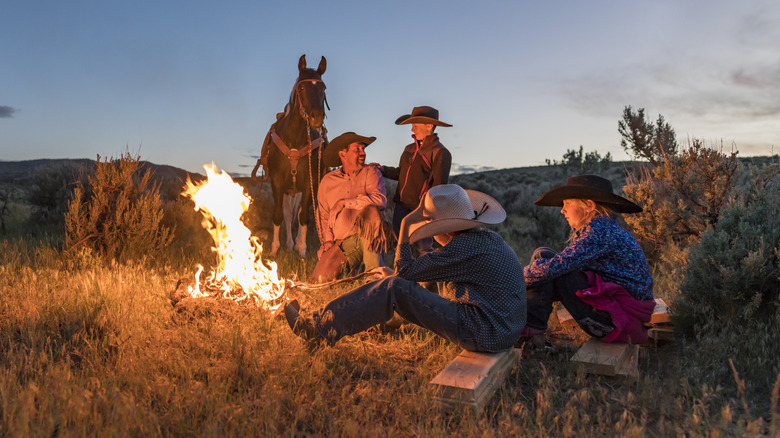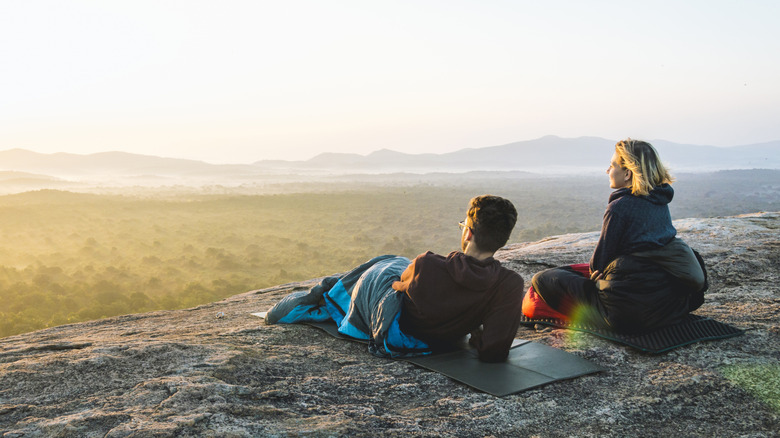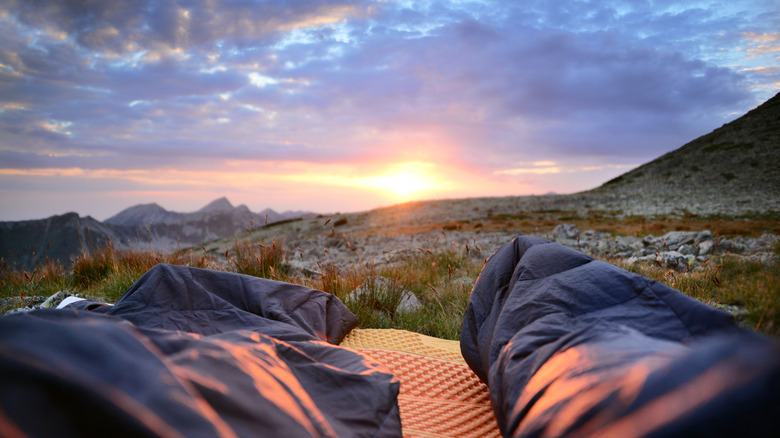What It Means To Go 'Cowboy Camping' And Why It's Gaining Popularity
Camping these days can mean just about anything. You might be tucked into a king-sized bed in a luxury RV, sipping coffee from a French press, or maybe you enjoy spending the night in a gorgeous, yurt-style tent complete with string lights. There's no wrong way to camp, but for some adventurers, the ultimate getaway means stripping things right back. And that's where cowboy camping enters the chat.
Cowboy camping means sleeping under the stars with no canvas or RV walls between you and the vast night sky. It hearkens back to the Old West, when cowboys would sleep outdoors with little more than blankets or a bedroll for comfort. So, this kind of camping never meant lying on the hard ground completely exposed to the elements, and it definitely doesn't now!
To camp out successfully, you'll need a sleeping bag or some blankets, a sleeping pad, and a groundsheet. Most people recommend bringing a tarp or even a tent in case of rain, too. Tyvek is the preferred groundsheet material for many campers. It's super light and durable, and you can pick up a 3-by-7 foot piece for around $20 on Amazon. As for your sleeping pad, you may prefer a foam fill over an inflatable one to reduce the chances of a puncture wound ruining your sleep. If you take a tarp (and you should!), many experienced campers suggest setting it up in case of rain, but not sleeping under it unless you have to. After all, a tarp blocks your view of that million-star sky — and that's one of the main reasons many people are out there.
Why is cowboy camping gaining popularity?
More and more people are choosing the simple life and turning to cowboy camping: It was a big trend in 2024, and that looks set to continue in 2025. The experience of falling asleep under a starlit sky and waking up with the sunrise is a huge reason people camp like this. There's a deep, almost magical joy about being so connected with the rhythms of our world. Without barriers, you hear the sounds of the night much more clearly and are fully immersed in the landscape.
Many campers also love the simplicity of cowboy camping. Gear is kept to a minimum, reducing the thought process when packing and the weight you carry if you're hiking into campsites. You can set up and break down your camp quickly, which is great if you're on a multi-day thru-hiking adventure. You also avoid the balancing act of parking an RV, the fight to pitch a tent against a gale-force wind, or even the downsides of using a rooftop tent. Plus, the lack of gear means cowboy camping may be cheaper than tent camping (or certainly RV-ing!).
Where to try cowboy camping
Cowboy camping doesn't mean bedding down wherever you lay your hat. (Well, you can, but you might not have the best sleep of your life!) It won't come as a surprise that areas with little rain are considered the best locations, with the deserts of the southwest and California offering prime conditions. There are many reasons for this, including that you're unlikely to get caught in an unexpected shower, and the clear skies allow for spectacular stargazing. Check out our article covering the top-ranked U.S. campsites for views of starlit skies to find your perfect spot.
Desert regions also tend to be less buggy, and you can test out the increasingly popular dry camping. Staying far away from water will mean you're less likely to deal with a swarm of mosquitoes feasting on you while you get a good night's rest. But all's not lost if you won't be in the desert anytime soon.
To enjoy cowboy camping in rainy or buggy areas, pick up a bivouac (bivy) sack. This lightweight, waterproof cover slips over your sleeping bag and often encloses your head as well as your body. Choose a mesh one to still enjoy great views. While some will argue using a bivy isn't true cowboy camping, forget the semantics and get a great night's sleep under the stars.


